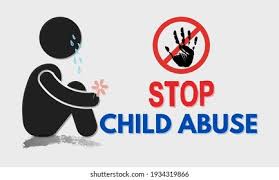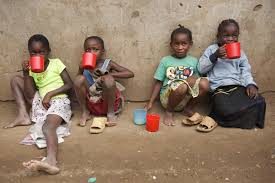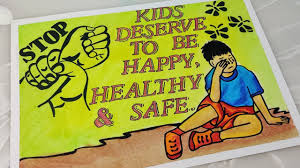Despite the knowledge of these laws, it will be hypocritical to say that we don’t know that Clergy men and women, Law makers, Executives and custodians and executors of the law also deliberately flout these laws on child trafficking. Sadly, child trafficking is even institutionalized by some religious organizations and they code name the act as Missionary Exchange of Children, but the bottom line is stylishly sending children out of less privileged parents houses to places where those children are used as slaves. Some people work as agents in this regard, making brisk business out of it. The agents collect money for scouting for a child and also gets paid by the middle man who links him up with a child slave, often called house helps or maids
To write or speak about Child trafficking, one need to first define who a child is and what age makes a human a child. According to the United Nations Convention on the Rights of the Child (CRC), a child is defined as a human being whose age is below 18, except when the law says something different in specific countries. A child is one who has not attained age of maturity, an age when he or she can decide for themselves on what they want to do.
In other words, anyone under the age of 18 is considered a child; unless the laws of their country or jurisdiction specify a different age on this.
WHY FROWN AT CHILD TRAFICKING?
Having someone else’ child in or under your custody is not a bad idea, in fact in the olden days, it’s a way of helping the less privileged members of the family to raise their unplanned children and also seemingly adopt such children as ours. Many African countries engage in these practice and by these, many hopeless and helpless children, raised by well to do family members become notable persons in life. Many of such children acquired education to greatest heights in life through this practice and even extend same to children of those who raised them up. This practice became rampant at some point that even parents who have the wherewithal to raise their own children still send them away from them, just with the intention of making the children learn some morals, different from what their biological parents can ever offer them. If things didn’t degenerate into abuse and maltreatment of children of others, no one would have frowned at this practice because it’s a valuable culture of expanding family ties and network and fostering cordiality in relationships across board.

However, by the passage of time, all these kindness towards distant relations wane down and such children from other family members brought in to assist or live with their uncle, aunt or a distant relation began to get maltreated by either wife of the relative who brought them or their spoilt children. In some cases, such children become mentally deranged, some are demoralized and some subject of abuse by children of the hosting families without their parents speaking against such inhuman acts. Most of the Less-privileged children get exploited and forced to perform tasks beyond their mental and physical capabilities and often against their will. Some are given low priority medical attention compared to when their biological children are involved and such children are sent to schools different from that of their biological children. Speaking from the experiences of about a hundred respondents in an online medium, the horrific experience of many is better imagined than experienced. After aggregating these experiences, one is bound to conclude and join those who speak against this practice as not just being bad but criminal.

Legally speaking, I may not be a lawyer but I am knowledgeable in some areas of law concerning child’s rights, so, I can safely say that, Child trafficking is not just bad but a serious crime. When a child is recruited to perform a task against his will, gets transported away from their biological parents and harbored by an entirely strange tribe or even race, it not only puts the child in danger but denies such a child right to freedom and moral balance. In some cases, Christian slave masters, so to say often change the names of these trafficked children to suit their religion and choice without considering the interest of these children. An child can decide to act in an adolescent manner to his or her parents but any such attempt to their employer could earn the child serious beating or denied meal for a day or more. What the biological parents will accommodate as a child’s play and over look or welcome will land the slave child, a non biological child some level of regret. There are several of such cases that third parties report to the ministry of women affairs in some states, social development in other states. We heard of cases of host parents or better call them task masters burning someone else child with pressing Iron, cutting someone else’s child with blade and putting pepper on the wound after inserting red hot iron rod in private parts just because a child, the offender isn’t their biological children.
These and many other reasons, we see child trafficking as considered a form of modern-day slavery and a violation of children’s rights and dignity. The United Nations Convention on the Rights of the Child and the Palermo Protocol to Prevent, Suppress and Punish Trafficking in Persons, Especially Women and Children, are two key international instruments that prohibit child trafficking and provide a framework for countries to prevent, investigate, and prosecute this crime; and is punishable under international law, as well as under the laws of most countries.
Despite the knowledge of these laws, it will be hypocritical to say that we don’t know that Clergy men and women, Law makers, Executives and custodians and executors of the law also deliberately flout these laws on child trafficking. Sadly, child trafficking is even institutionalized by some religious organizations and they code name the act as Missionary Exchange of Children, but the bottom line is stylishly sending children out of less privileged parents houses to places where those children are used as slaves. Some people work as agents in this regard, making brisk business out of it. The agents collect money for scouting for a child and also gets paid by the middle man who links him up with a child slave, often called house helps or maids. In some cases, the child is prized and encouraged to stay back because they are lured with opportunity to go to school. Some employers are nice, they treat the children nice but will never allow these children attend a school close to the standard of their own children. Wickedly, these children come home same time with the children of their masters but will be harassed to rush and make food for the family, as if the maid has two lifes or cannot be as tired as the children of their masters.
In the same vein, highly placed persons, lawmakers, police and all custodians of law directly or indirectly flout the law on child trafficking. The term that is most commonly used to describe a crime committed by lawmakers or public officials is “Malfeasance”. Malfeasance refers to the intentional commission of an unlawful act by a public official or someone in a position of authority of Necessity? When these highly placed individuals indulge in law breaking, upholding the law or standing against the breakage of the law become very difficult if not impossible.
Sadly, there is the experience that in some cases, children of the rich who hired slave girls often abuse their maids and such issues are never allowed to get into public domain while some often see such abuse as legitimate right of their children and interpreted to mean a privildged that their child rapes or abus and in some cases, its not the children that involves in rape, abuse and sexually harassing the maids and to whom will such stories be acceptable if told. It takes Godly intervention for such a story to be proven and culprit ‘brought to book, Its almost a taboo’ that the madam of the house, wife of a suspect rapist of a house main=d will testify against her husband; the maid will rather stay silent forever, lick her wounds or get blackmailed as enticing her husband and sent packing.
This is why all stakeholders must as a matter of urgency put heads down and in a round discuss end to child trafficking and child slavery in all ramifications so that every child’s life may count and no child will be made a slave to another child because of opportunistic difference or difference in pedigree. Dear reader, wherever you see this crime being committed, please endeavour to inform appropriate quarters or reach out to me, so that we can all put an end to this crime in our society. Do not forget, we are born same way, we are equally endowed, opportunity difference makes the rich seem superior to the children of the poor.
END



